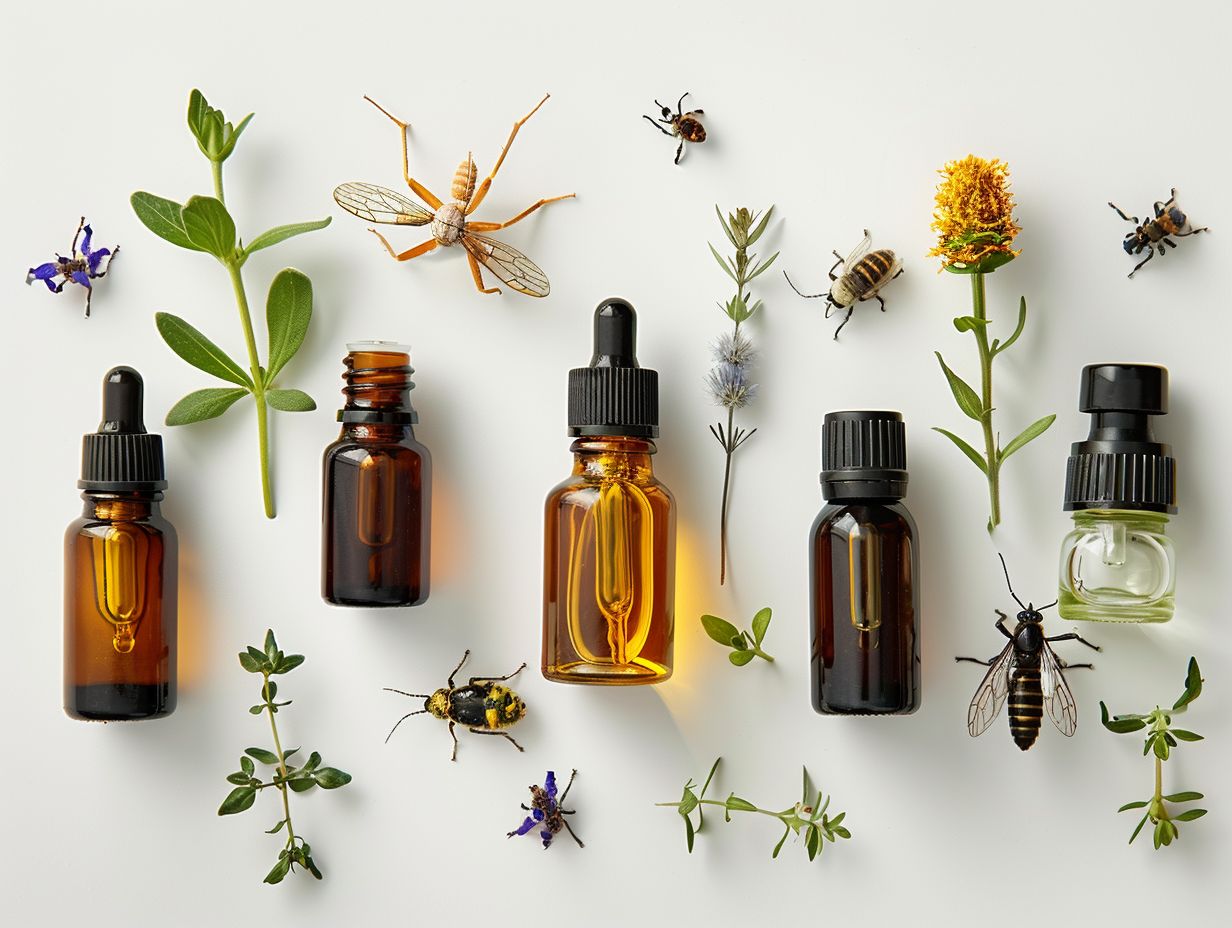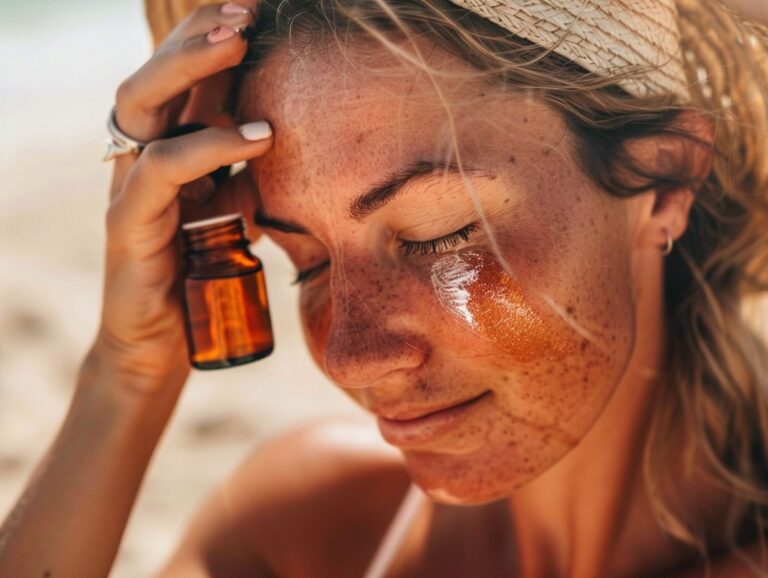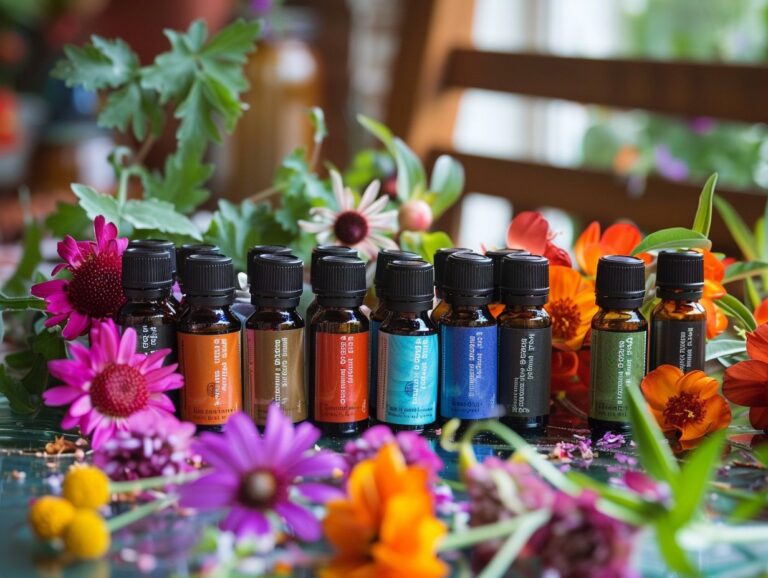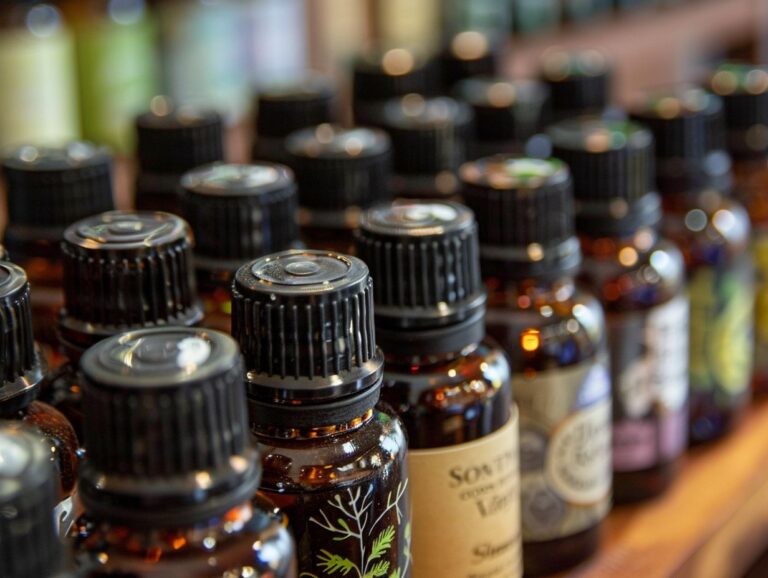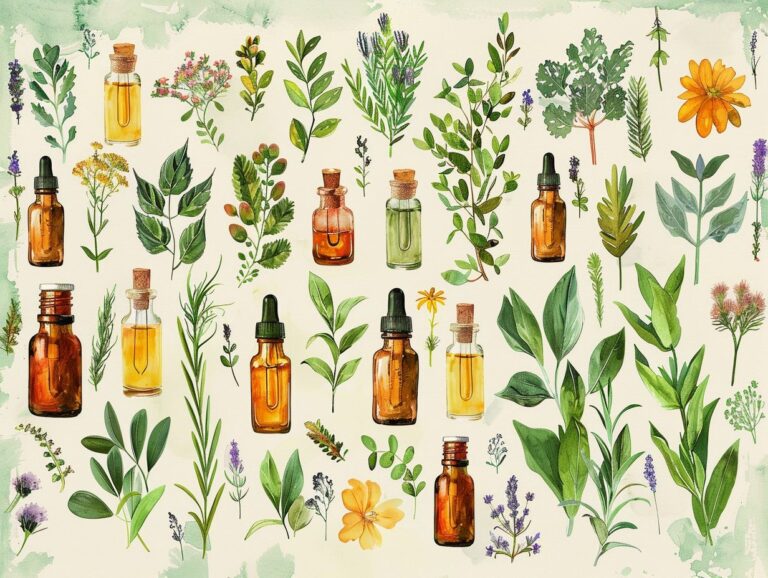What Essential Oils Are Good for Bug Bites
Do bug bites have you itching and in pain? Essential oils may provide relief.
Explore the anti-inflammatory properties of essential oils and how they can soothe itching and pain caused by bug bites.
Discover the best essential oils to use for bug bites, such as tea tree oil, lavender oil, peppermint oil, eucalyptus oil, and chamomile oil.
Get tips on effectively using essential oils for bug bites, along with highlighting potential risks and side effects to be aware of.
Learn more about when to seek medical attention for bug bites.
Key Takeaways:
What Are Essential Oils?
Essential oils are highly concentrated plant extracts that retain the natural scent and flavor, or essence, of their source. They are obtained through distillation or mechanical methods from flowers, leaves, stems, roots, or other parts of plants. Essential oils have been used for centuries as natural remedies for various ailments and are popular for their therapeutic properties, including benefits for the skin.
One of the most popular essential oils for skin health is chamomile oil, known for its soothing and anti-inflammatory properties, making it ideal for treating conditions like eczema or acne.
Another versatile option is lavender oil, celebrated for its calming effects on the skin and mind, often used in aromatherapy. Historically, essential oils have been integral in practices like Ayurveda and Traditional Chinese Medicine, where they were revered for their holistic healing potential.
The extraction process of essential oils varies from steam distillation to cold pressing, ensuring the potency and purity of these botanical wonders. Incorporating essential oils into your skincare routine can provide a natural and effective way to nourish and rejuvenate the skin.
How Do Essential Oils Help with Bug Bites?
Essential oils are known for their anti-inflammatory and antimicrobial properties, making them effective natural remedies for treating bug bites. When applied to the affected area, essential oils can help reduce inflammation, relieve itching, and prevent infection caused by bug bites.
The use of lavender oil is particularly beneficial in this regard, as it not only soothes the skin but also has antiseptic properties that can help keep the bug bite area clean and free from bacteria. Additionally, tea tree oil is another popular choice due to its potent antimicrobial effects, which can aid in preventing any potential infections. These essential oils provide a safe and natural remedy that is gentle on the skin, making them a popular choice for bug bite relief.
What Are the Anti-inflammatory Properties of Essential Oils?
Essential oils like chamomile oil, camphor oil, and lavender oil exhibit potent anti-inflammatory properties due to their unique chemical compositions. These oils can help reduce redness, swelling, and pain associated with inflammatory conditions, making them valuable natural remedies for managing various skin issues.
Chamomile oil is known for its calming and soothing effects on the skin, making it ideal for inflammation caused by conditions like eczema or psoriasis.
Camphor oil, with its cooling sensation, offers quick relief from inflammation and muscle pain, commonly used in topical rubs.
Lavender oil, besides its pleasant aroma, has been proven to reduce inflammation and promote faster healing of wounds and burns.
How Do Essential Oils Soothe Itching and Pain?
Essential oils such as lavender oil, tea tree oil, and camphor oil possess soothing properties that can effectively relieve itching and pain associated with bug bites. These oils have calming effects on the skin, providing relief from discomfort and promoting healing.
Lavender oil is renowned for its ability to reduce inflammation and redness, making it ideal for soothing irritated skin. Tea tree oil, with its antimicrobial and antiseptic properties, helps prevent infection in bug bite wounds while reducing itching. Camphor oil offers a cooling sensation, numbing the area and providing instant relief from pain. Together, these oils create a powerful blend that not only alleviates discomfort but also accelerates the healing process, leaving the skin nourished and rejuvenated.
What Are the Best Essential Oils for Bug Bites?
In terms of treating bug bites, some of the best essential oils to consider include tea tree oil, lavender oil, peppermint oil, and chamomile oil. These oils have proven anti-inflammatory and antimicrobial properties that can help alleviate symptoms and promote healing.
Tea tree oil, known for its powerful antimicrobial properties, can help prevent infection when applied to bug bites. Its natural antiseptic qualities also assist in reducing itching and swelling, providing quick relief.
Lavender oil, with its soothing aroma and anti-inflammatory effects, aids in calming the skin and reducing redness caused by bug bites.
Peppermint oil, known for its cooling sensation, can provide immediate relief from itching and discomfort. Its analgesic properties help numb the area, offering temporary relief.
Chamomile oil, with its gentle and calming nature, not only reduces inflammation but also helps with skin regeneration, aiding in the healing process of bug bites.
Tea Tree Oil
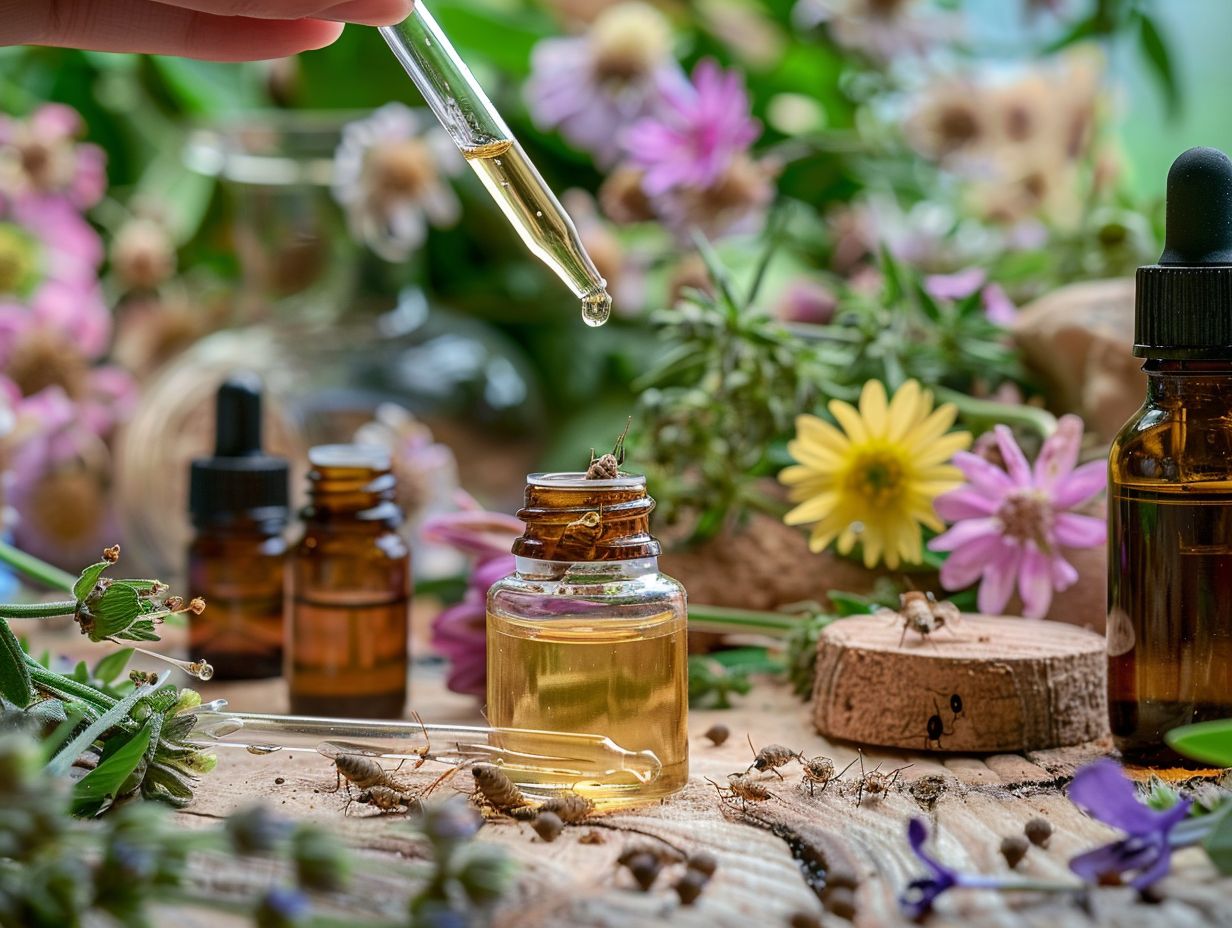
When applied to bug bites, tea tree essential oil acts swiftly to reduce redness, swelling, and itching, providing instant relief. Its natural properties penetrate the skin to calm the irritation and accelerate the healing process, ensuring a faster recovery. The oil’s ability to combat bacteria not only prevents infections in the affected area but also keeps the skin clean and free from harmful microorganisms, promoting overall skin health. The soothing aroma of tea tree oil can provide a calming effect, helping to alleviate any discomfort caused by bug bites.
Lavender Oil
Lavender essential oil is widely recognized for its soothing and anti-inflammatory properties, making it a popular choice for relieving bug bites. Its calming scent and gentle effects on the skin contribute to its effectiveness in managing itching and discomfort.
When applied to bug bites, lavender essential oil helps reduce inflammation and redness, providing relief from the itching sensation. The natural compounds found in lavender, such as linalool and linalyl acetate, have been shown to have analgesic and anti-inflammatory properties, soothing the affected skin. The antimicrobial properties of lavender oil can help prevent infection in bug bites, promoting faster healing. Its mild nature makes it suitable for sensitive skin, and the aromatherapy benefits can also help reduce stress and anxiety that often accompany bug bites.
Peppermint Oil
Peppermint oil is known for its cooling and anti-inflammatory properties, making it a refreshing choice for soothing bug bites. Its menthol content provides a cooling sensation that can alleviate itching and discomfort.
Peppermint oil’s anti-inflammatory nature can help reduce redness and swelling around the affected area, promoting quick relief. When applied topically, it can create a protective barrier that prevents further irritation from spreading. The aromatic scent of peppermint oil not only offers a pleasant experience but also acts as a natural insect repellent, potentially preventing future bug bites. Thanks to its multi-faceted benefits, peppermint oil serves as a versatile remedy for various skin conditions, including bug bites.
Eucalyptus Oil
Eucalyptus oil offers antibacterial properties that can help prevent infections in bug bites, aiding in the wound healing process. Its fresh scent and skin-nourishing qualities make it a beneficial option for bug bite relief.
Rich in cineole, a key compound known for its antibacterial and anti-inflammatory properties, eucalyptus oil acts as a natural barrier against harmful bacteria that may enter the skin through bug bites. When applied topically, this essential oil can soothe itching and reduce inflammation, providing relief from discomfort caused by insect bites. Eucalyptus oil promotes circulation to the affected area, accelerating the healing process and supporting the regeneration of damaged skin cells. Its cooling effect also helps alleviate the pain and swelling associated with bug bites, making it a versatile remedy for minor skin irritations.
Chamomile Oil
Chamomile oil is revered for its anti-inflammatory properties, making it an excellent choice for soothing bug bites. Its gentle nature and skin-calming effects contribute to its effectiveness in reducing itching and inflammation.
Chamomile oil is known for its ability to accelerate wound healing and promote healthy skin regeneration, thanks to its antioxidant and antimicrobial properties. The soothing aroma of chamomile also has a calming effect on the mind, helping to alleviate stress and promote relaxation. When applied to the skin, chamomile oil can help balance sebum production, making it beneficial for those with oily or acne-prone skin. Regular use of chamomile oil can result in a clearer, brighter complexion and improved overall skin health.
How to Use Essential Oils for Bug Bites?
To effectively use essential oils for bug bites, it is recommended to dilute them with carrier oils before application to the affected area. Dilution helps prevent skin irritation and ensures proper absorption of the essential oils for optimal relief.
Direct application of essential oils without dilution can lead to skin sensitivity or adverse reactions in some individuals. Proper dilution ratios can vary depending on the type of essential oil and the individual’s skin sensitivity. It is advisable to start with a lower concentration and adjust as needed. Essential oils like lavender, tea tree, and chamomile have soothing properties that can help reduce itching and inflammation associated with bug bites.
Diluting Essential Oils with Carrier Oils
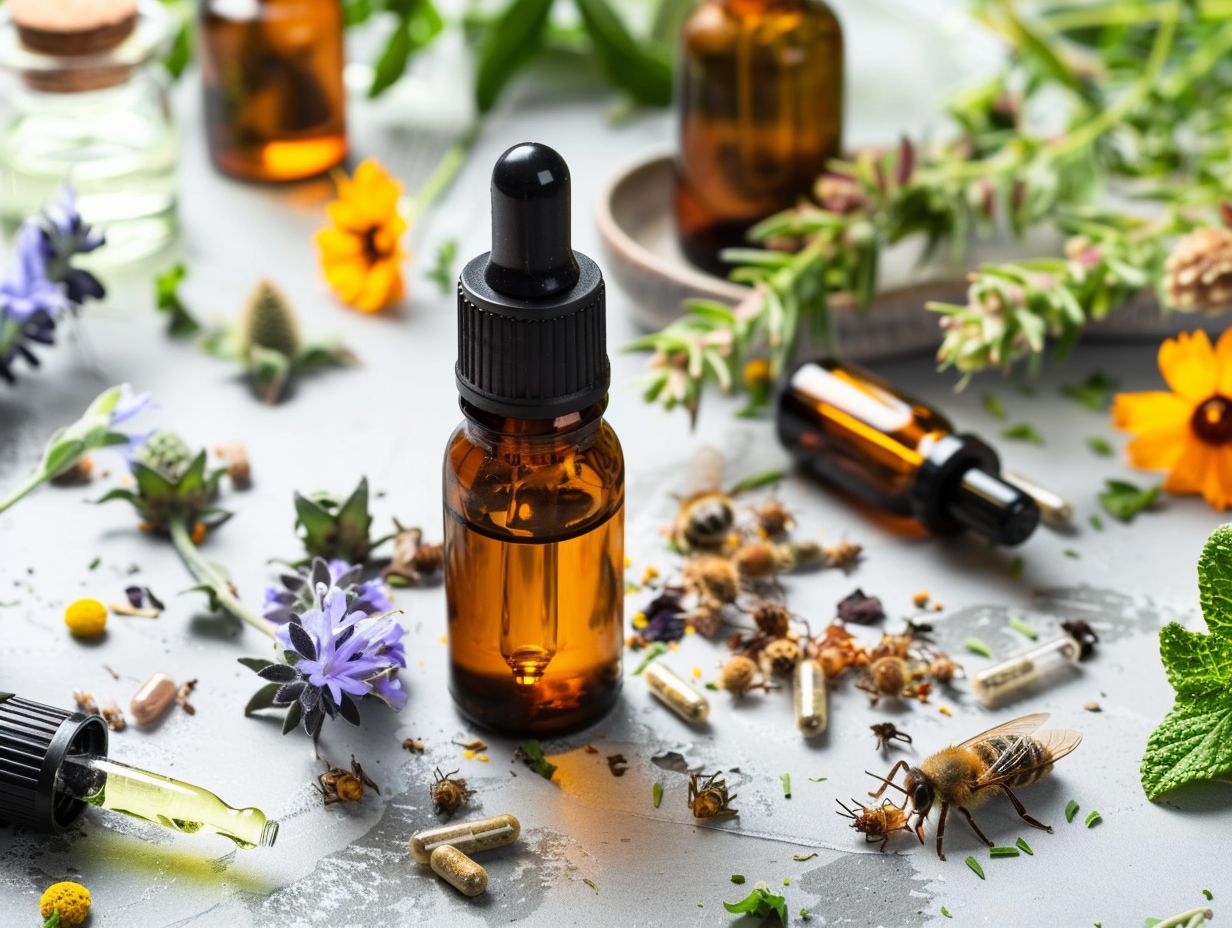
Proper dilution ratios are crucial in avoiding adverse reactions, with a common guideline being 2-3 drops of essential oil per teaspoon of carrier oil. Coconut oil is renowned for its moisturizing properties, while almond oil is gentle and suitable for most skin types. These carrier oils also aid in soothing inflamed skin and reducing itchiness.
By diluting essential oils, you create a milder formulation that is safer to apply directly on the skin. Carrier oils act as a protective barrier, preventing the essential oils from evaporating quickly, prolonging their effects on bug bite relief.
Applying Directly to the Bite
Directly applying essential oils to bug bites can provide quick relief from itching and inflammation. Gently massage a small amount of diluted essential oil onto the affected area to soothe the skin and promote healing.
Essential oils possess natural anti-inflammatory and antimicrobial properties, making them effective remedies for bug bites. The immediate relief they offer can significantly reduce discomfort and improve the healing process. When applying essential oils, remember to dilute them with a carrier oil like coconut or almond oil to avoid skin irritation. The gentle massage not only helps in absorption but also enhances circulation, aiding in faster recovery. Using essential oils for skin healing minimizes the chances of scarring and promotes a more natural regeneration process.
Using Essential Oil-based Insect Repellents
Utilizing essential oil-based insect repellents can help prevent bug bites in the first place, offering a natural and skin-friendly alternative to chemical repellents. These repellents often combine essential oils known for their bug-repelling properties to provide effective protection.
The use of essential oil-based insect repellents is not only beneficial in keeping bug bites at bay but also nourishing for the skin. The natural ingredients in these repellents, such as citronella, lavender, or eucalyptus oils, are gentle and soothing, making them suitable for sensitive skin types.
The effectiveness of essential oil-based repellents in repelling insects is well-documented. Many essential oils have strong insect-repelling properties, deterring bugs while emitting pleasant scents that humans enjoy.
Are There Any Risks or Side Effects of Using Essential Oils for Bug Bites?
While essential oils can be beneficial for treating bug bites, there are potential risks and side effects to consider. Skin irritation, allergic reactions, and photosensitivity are some of the common concerns associated with using essential oils for bug bite relief.
It is important to note that some essential oils like witch hazel, basil, and camphor can cause skin irritation, especially when applied directly to the skin in undiluted form. Allergic reactions may occur in individuals sensitive to certain oils, leading to redness, itching, or even swelling at the affected area. Certain essential oils, such as citrus-based oils, can cause photosensitivity, making the skin more prone to sunburn and damage when exposed to sunlight after application.
Skin Irritation
Skin irritation is a common side effect of using essential oils for bug bites, especially for individuals with sensitive skin. It is essential to perform a patch test before widespread application to avoid adverse reactions.
When using essential oils to alleviate bug bites, it is crucial to be aware of the potential risk of skin irritation, which can manifest as redness, itching, or even a burning sensation. To prevent such reactions, individuals should dilute the essential oil with a carrier oil before application. Performing a patch test on a small area of the skin, like the forearm, can help determine if any sensitivity or allergic reaction may occur.
Since skin sensitivity varies from person to person, what may work well for one individual could cause irritation in another. Therefore, it is wise to proceed cautiously and adhere to proper precautions before using essential oils extensively. If any signs of irritation or discomfort arise, it is advisable to discontinue use and seek medical advice. Awareness of skin sensitivity and taking preventive measures can ensure a more pleasant and effective experience with essential oils for bug bites.
Allergic Reactions
Some individuals may experience allergic reactions to certain essential oils when used for bug bite relief. Symptoms may include itching, redness, or swelling, and immediate medical attention is necessary in severe cases.
When dealing with allergic reactions to essential oils, it’s crucial to act swiftly. In more severe cases, the symptoms can escalate quickly, leading to difficulty in breathing or even anaphylaxis. If someone experiences these severe symptoms after applying essential oils, it’s important to call emergency services immediately. This highlights the importance of knowing which specific oils can trigger allergies in individuals, as it aids in the quick identification during emergencies.
Preventive measures such as patch testing can also help in identifying potential allergens prior to widespread use.
Photosensitivity
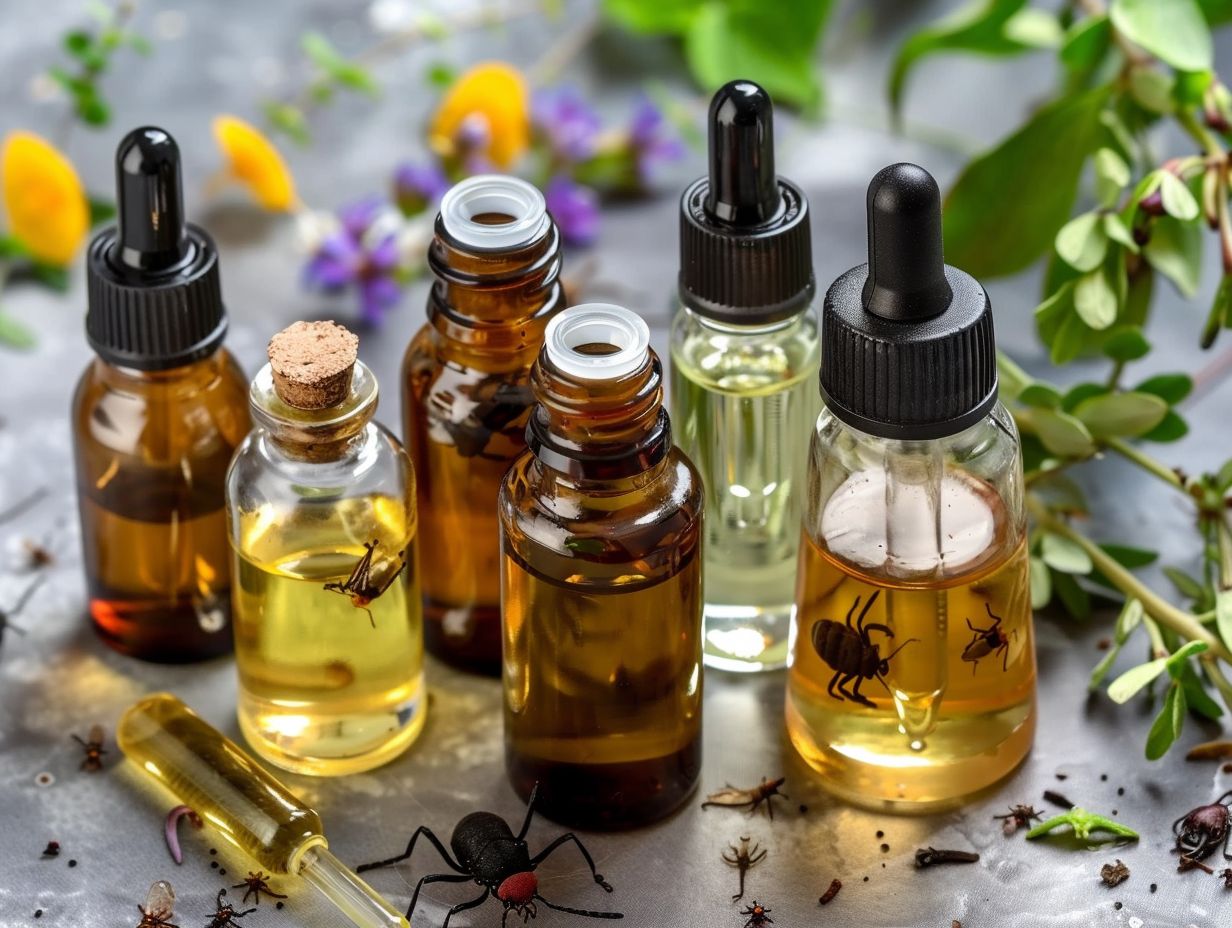
Photosensitivity reactions can occur when using certain essential oils for bug bite relief, leading to increased sensitivity to sunlight and potential skin damage. It is crucial to avoid sun exposure after applying photosensitive oils.
One of the most common photosensitive oils is bergamot, known for its bug-repelling properties. Other citrus oils like lemon, lime, and grapefruit also have high phototoxicity. To prevent reactions, dilute these oils properly before applying them to the skin or opt for non-photosensitive alternatives. Always perform a patch test prior to using any essential oil on bug bites.
When to Seek Medical Attention for Bug Bites?
While essential oils can offer relief for common bug bites, it is essential to seek medical attention if symptoms worsen or if you experience severe reactions such as persistent swelling, intense pain, or signs of infection.
Severe symptoms from bug bites may include severe allergic reactions like difficulty breathing, dizziness, or rapid heartbeat, which necessitate immediate medical help. Risks of infection arise when bites become overly swollen, oozing pus, or showing red streaks spreading from the bite.
Professional intervention becomes crucial if symptoms persist beyond a couple of days, as it may indicate a more severe reaction or underlying health concerns. Ignoring these warning signs could lead to complicated health issues, making early treatment paramount.
Frequently Asked Questions
What Essential Oils Are Good for Bug Bites?
There are several essential oils that are known for their soothing and anti-inflammatory properties, making them effective in treating bug bites.
What are the best essential oils for relieving bug bite itching?
Lavender, peppermint, and tea tree oil are all great options for relieving bug bite itching.
Can essential oils also help with swelling and redness caused by bug bites?
Yes, certain essential oils like chamomile and eucalyptus have anti-inflammatory properties that can help reduce swelling and redness from bug bites.
Are there any essential oils that can repel insects and prevent bug bites?
Yes, citronella, lemongrass, and lemon eucalyptus essential oils are all known for their insect-repelling properties and can help prevent bug bites.
How should I use essential oils for bug bites?
Essential oils should always be diluted with a carrier oil before applying to the skin. You can also mix them with water in a spray bottle for easy application.
Are there any precautions I should take when using essential oils for bug bites?
It is important to patch test before using essential oils, as some people may have allergies. Also, avoid using essential oils on open wounds or near the eyes.

